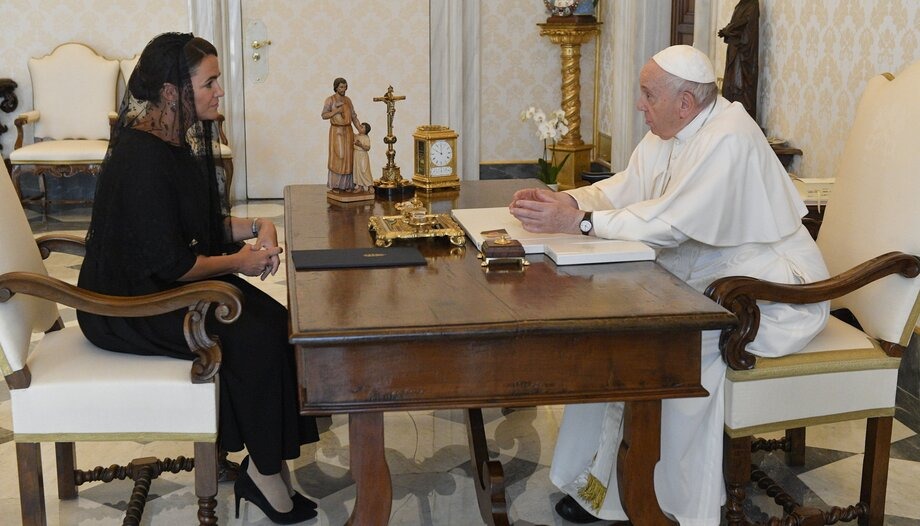The Holy Father will visit Hungary during the Easter season. He will visit the capital, Budapest, from April 28-30, 2023. The highlight of the three-day apostolic journey to the Central European country will be a Holy Mass in front of the Hungarian Parliament building on Sunday.
"The Pope's apostolic journey is a very important event, not only for Catholics, but for all Hungarians on both sides of the border," the Hungarian Bishops' Conference announced shortly after the Vatican officially announced the visit. "Due to the age of the Holy Father, the meetings will take place [only] in Budapest, to which we cordially invite and expect all people from our country and neighboring countries - especially for the Holy Mass on Sunday."
Pope Francis is visiting the Central European country for the second time in his tenure. In September 2021, he attended the World Eucharistic Congress in Budapest and celebrated Holy Mass in Heroes' Square. The fact that the Pope spent only a few hours in the Hungarian capital and then traveled directly to Slovakia to make an apostolic visit gave rise to speculation at the time. It was said that he might have expressed his disapproval of the restrictive refugee policy of Hungary's right-wing nationalist Prime Minister Viktor Orbán. However, such interpretations were immediately rejected by church authorities.
A trip of a social nature
The Holy Father's visit this time - in addition to official appointments with representatives of the State and the local Church - has a clear social focus. On Saturday, Francis will visit an institution for children blind and visually impaired. The "Blessed Ladislaus Batthyány Home for the Blind" in Budapest consists of a kindergarten, a school and a children's home and was founded in 1982, still in the communist era, by the committed nun and curative teacher Anna Fehér, who passed away in 2021. The institution is named after the ophthalmologist and father of the family Ladislaus Batthyány-Strattmann (1870-1931), beatified in 2003. This Hungarian nobleman was a lifelong advocate of good medical care for the poor and needy.
Also on Saturday there will be a meeting with the poor and refugees in a church in Budapest. In the afternoon, there will be a meeting of the Pope with young people in the László Papp sports hall. On Sunday, after Holy Mass, the Holy Father will also meet with representatives of the sciences and universities at the Péter Pázmány Catholic University.
The President of Hungary, Katalin Novák, had extended an invitation to Francis the previous year. The politician had visited Francis at the Vatican in August 2022. Novák, who belongs to the Reformed Church, repeatedly stresses her commitment to Christianity and traditional family values. The woman, married and mother of three children, had been Hungarian Minister of Family Affairs before taking office as head of state in May 2022 and is considered a faithful companion of Hungarian Prime Minister Orbán. The Head of Government himself visited the Pope in April 2022.
Religion in Hungary
Orbán has ruled Hungary with a two-thirds majority in Parliament since 2010. He and his cabinet have strongly supported and clearly favored the country's so-called "historic churches" since coming to power. The Hungarian church policy, quite liberal since the end of communism, which essentially treated all registered religious communities equally from a state perspective, was replaced under Orbán's government by a system of state recognition at various levels. The list of "recognized churches," the highest level of this system, currently includes 32 communities, mainly Christian. In addition, there are several Muslim, Jewish and Buddhist groups.
They receive numerous financial benefits and subsidies from the state, especially for their social and educational institutions. In turn, the state systematically transfers extensive tasks in the fields of education, social affairs and culture to religious communities. Thus, in recent years, public schools in many parts of the country have passed into the hands of the Church, sometimes despite the disapproval of parents and teachers. There are also critical voices within the Church about this close relationship between Church and State and also about the political sympathies sometimes openly shown by some church officials for the ruling Fidesz party.
In terms of the religious affiliation of the population, secularization and the movement of people away from traditional religious communities are also increasingly advancing in Hungary. According to the 2011 census, 3.9 million Catholics lived in Hungary, accounting for 37% of the population and thus the largest religious community in the country. (More recent data is not yet available, as the results of the latest 2022 census have not yet been fully published).
However, only ten years earlier, 51% had professed Catholicism. On the other hand, the proportion of those who did not want to answer the question about their religious denomination was 27%. Another 19% of respondents openly described themselves as "no religious denomination". These two groups were even in the majority in the formerly Protestant east of the country, while Catholicism remained the dominant religion in the west and north. The second largest religious group in the country was the Reformed (Calvinists), with 11%, and Evangelicals (Lutherans) ranked third, with 2%. The percentage of all other religious communities was significantly lower.
For many years, the voluntary donation of 1% of annual income tax to a religious community, aid organization or non-governmental organization has played an important role in the financing of religious communities. In this area, the Catholic Church remains clearly in first place among religious groups. Overall, however, the relief service has received the most income tax donations in recent years.








